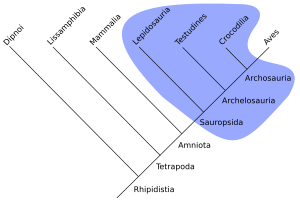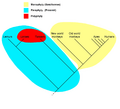Monophyly facts for kids
Monophyly is a science term that means a group of living things all came from one single ancestor. Think of it like a family tree where everyone in a specific branch can trace their family back to just one great-grandparent.
Scientists who study how living things are related use a system called cladistics. Their goal is to organize living things into groups that show how they evolved from common ancestors.
If a group includes a common ancestor and all of its descendants, that group is called monophyletic. The word comes from Greek and means "of one race."
Sometimes, a group might include living things that don't share a recent common ancestor. This happens because they developed similar traits on their own, a process called convergent evolution. Such a group is called polyphyletic.
If a group includes a common ancestor but leaves out some of its descendants, it's called paraphyletic. For example, if you grouped all mammals but left out humans, that would be paraphyletic.
Scientists believe that all living things on Earth are monophyletic. This means they all came from one single origin, based on studies of their DNA.
Understanding Monophyletic Groups
Let's look at an example. The genus Homo includes all species like Homo sapiens (that's us!) and Homo habilis. All these species are believed to have come from the same ancestral form within the Hominidae family. Since no other descendants are known from that ancestor, the genus Homo is considered monophyletic.
If scientists found out that Homo habilis came from a different ancestor than Homo sapiens, and that ancestor wasn't included in the Homo group, then the group would be polyphyletic. Scientists usually prefer to keep groups monophyletic. So, they might either split the genus into smaller groups or make the genus bigger to include the new ancestral forms.
An example of a polyphyletic group is Sea slugs. They look similar, but some types of sea slugs evolved from different ancestors.
Plant Families and Polyploidy
Sometimes, it's tricky for scientists to fit plant species into a monophyletic group. This is often because of something called polyploidy. Polyploidy means a plant has more than two sets of chromosomes.
There's clear proof that some polyploid plant species have started more than once. For example, a plant called Salsify (Tragopogon miscellus) has formed as many as 20 times in eastern Washington.
Also, sometimes hybrids (mixtures) between two close plant species can become polyploid. When this happens, these polyploid plants can continue as a new, distinct species. These situations are a bit different from the usual rules of how species descend. Special decisions are made for them, guided by the International Commission of Botanical Nomenclature (ICBN).
Images for kids
See also
 In Spanish: Monofilético para niños
In Spanish: Monofilético para niños
 | Dorothy Vaughan |
 | Charles Henry Turner |
 | Hildrus Poindexter |
 | Henry Cecil McBay |



